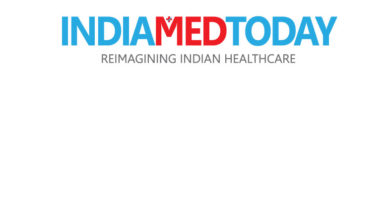HIMSS India 2018 Concluded on a High Note
HIMSS India Annual Conference and Exhibition brought together key stakeholders

The annual HIMSS India 2018 conference concluded on a high note with a promise to return with an even bigger and better event next year. More than 200 participants, including 20 speakers and moderators, attended the event held at Bangalore.
HIMSS India Annual Conference and Exhibition brought together key stakeholders from Government, Statutory

Bodies, Healthcare Providers, Payers, Life Sciences, Medical Device, Healthcare IT and solution providers for path-breaking collaborative discussions on healthcare IT issues, best practices and the latest in tools & technologies that drive and enhance the new age healthcare delivery and outcomes.
The theme of the conference discussed various topics related to current scenario in health-IT and outlook for 2018-20; AI, precision medicine and machine learning; advanced and predictive analytics; standards and interoperability; mHealth and Tele Medicine; Innovation and Startups and home healthcare & IT.
Rajendra Pratap Gupta, Advisor Ministry of Health and Family Welfare; Harkesh Dabas, Country Director, Clinton Health Access Initiative and William J Clinton Foundation and Dr. Devi Shetty, Chairman and Founder, Narayana Health were the keynote speaker. Ishaq Quadri, Secretary HIMSS India delivered the welcome address and set the tone for the event. “HIMSS India will organize a number of events for the other state chapters to explore health IT advances and exchange relevant, tangible ideas in the coming months.”
Talking about the policy reforms and its impact on digital health Gupta said that healthcare policy reform goals need to be supported by appropriate digital health technologies. “The goals of improving access, enhancing quality and lowering costs in healthcare cannot be achieved without digital health technologies,” he said. Industry should participate in policy making by sharing inputs analyzing and reporting on public policy documents he said.
One of the riveting talks on day one was delivered by K Chandrasekhar, CEO Forus Health who captivated the audience with a talk on AI in eye screening. He said that in their mission to eradicate preventable blindness from India AI has been able to democratize eye imaging. This has resulted in wider access to retinopathy diagnosis.

Rajesh Kuppuswamy : Healthcare Industry Lead- SAP India introduced the technologies that are helping hospitals improve care and J.P. Dwivedi, CIO – Rajiv Gandhi Cancer Institute spoke about the dilemmas CIOs and IT Heads face at the hospital and how hospitals can achieve its goals of better patient care through consolidated IT technology platforms.
An interesting panel comprising innovators and investors deliberated on startup lifecycle and funding leaning towards smart solutions to perennial problems. The panel included Manish Singhal, Founding Partner, Pi Ventures; Vaibhav Agrawal, Partner Lightspeed; Dr. Geetha Manjunath, CEO, Niramai and Balaji Vishwanathan, CEO Invento. This lively panel was moderated by Dr Vivek Sahi.
According to the panel market size and the team are the two most important considerations while evaluating new start-ups. A driven sense of purpose and unique market insights are also desirable traits in startups. While all panelists agreed that there is potential in the Indian healthcare market for technology players they also pointed out the difficulty of this market when it came to implementation.
Dr Devi Shetty delivering his keynote address talked about the challenge that our leaders will face as demand for healthcare increases. “Is it possible to make healthcare accessible for at least 40-50% of the population with the current resources and budgetary allocations?” he asked.
Sighting examples from his practice Dr Shetty explained how technology can be used to deliver last-mile healthcare. “Online healthcare will dramatically change the way healthcare is delivered in India and globally,” he said.
“Anyone with medical history or chronic disease should have their medical history on the mobile phone,” he emphasized. He also said that technology can change the way in which skilled professionals offer healthcare. He also said that the world’s largest healthcare provider will have no beds it will be software. The only question that remains is who will develop it.
The chief guest for the day Harkesh Dabas talked about technology as an enabler to bridge the inefficiency gap in healthcare delivery. Healthcare landscape is waiting to be disrupted, he said.
He also talked about the failures in public health delivery and the lessons one can learn from them. Technology providers should start with the problem and then work backwards to solve it, he said. He also said that adoption of technology should be easy else great technologies also tend to fail.
The other session that were well appreciated were improving clinical outcomes through digital transformation by Shireesh Sahai, CEO, Wolters Kluwer, India. Following this Dr. Vivek Sahi, Girish Koppar, and Manoj Paul presented the results of HIMSS survey on Data Capture conducted in India. They also spoke about what steps the association is taking for better adoption of HIM systems in India and the guidance on adoption model for analytics maturity.
The HIMSS Analytics Adoption Model for Analytics Maturity (AMAM) is designed to measure and advance an organisation’s analytics capabilities. The HIMSS AMAM certification which was earlier only available in Singapore is now available in India and CIOs were invited to make use of it.
One of the focused sessions on day two was the CIO Conclave: IT Transformation Challenges and Solutions moderated by Arvind Sivaramakrishnan, CIO Apollo Hospitals. Rajendra Kshirsagar, CIO Meitra Hospital and Ashokkan S, CIO Columbia Asia Hospital shared their inputs on a variety of topics from Ayushman Bharat to Telemedicine implementation and interaoperability issues.
The formal vote of thanks was proposed by Dr. Nitiraj Gandhi, Jt. Secretary HIMSS India.

